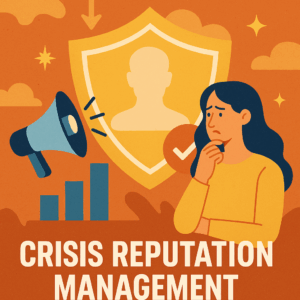In today’s digital-first world, a single misstep—like the viral Domino’s cheese prank—can obliterate public trust overnight. That’s why crisis reputation management isn’t optional; it’s the foundation of resilient brands. It’s not only about fixing mistakes, but emotionally connecting with your audience through accountability and transparency.
1. Reputation = emotional capital
Leading reputation specialist Emma Woollcott stresses that reputation is not just about perception—it’s about feelings. Brands are judged by the emotional impressions they leave: stable, bold, trustworthy, or bland. Understanding this, crisis reputation management must focus on empathy, clarity, and value alignment to sustain trust.
2. Plan ahead, don’t wait for a crisis
Expert consensus—from Mishcon Dore to Pierpont—and industry frameworks underscore this: most crises are preventable. Early warning signs often involve cultural missteps, poor governance, or ignored employee concerns. Developing a crisis plan with simulations, clear decision trees, and rest cycles ensures your team can act calmly and swiftly under pressure Examples.compiercom.com.
3. Assemble the right people & decision structure
When a crisis hits, speed matters. Start with a small, agile core group—senior comms, legal, leadership—and clearly define roles, communication channels (e.g., Slack, WhatsApp), and responsibilities. Broader teams can support as needed. Coordination across PR, legal, and operations is critical for consistent messaging and swift action.
4. Navigate fragmented media and social platforms
With news now sprouting from social feeds, influencers, and micro-channels, managing false narratives requires targeted intelligence—not chasing every troll. Identify key voices and patterns, verify who’s behind the noise, and respond strategically. Counter with clear factual content and credible journalist partnerships, not a scattershot rebuttal.
5. Transparency—strike the right tone
Going silent is no longer an option. Brands should preempt critiques with honest admissions (stealing thunder), sincere apologies, and controlled messaging. But balance is key: divulge enough to foster trust while safeguarding legal and operational integrity LinkedIn.
Key Takeaways for effective crisis reputation management
| Strategy | Impact |
|---|---|
| Emotional resonance | Builds trust beyond facts |
| Crisis drills & governance checks | Prevents major fallout |
| Lean & empowered teams | Enables quick, clear decisions |
| Targeted monitoring & response | Cuts through media noise |
| Transparent messaging with tone control | Maintains legal safety & public faith |
Final thoughts
Crisis reputation management is a discipline—blending psychology, process, and communication craft. Brands flourish not by avoiding errors but by their speed, empathy, and strategic handling when things go wrong. Set the systems, empower the people, and train the muscle—so when a crisis hits, you’re ready to lead with integrity and emotion.


